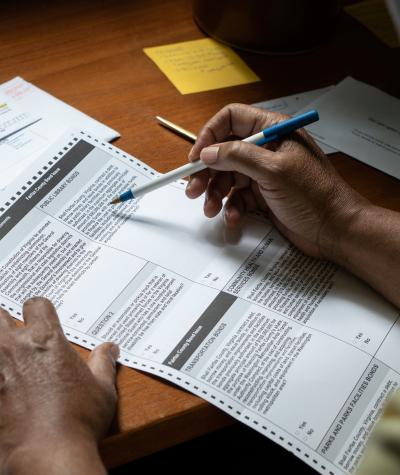Citizen-led state ballot initiatives play an important role in making democracy more accountable, transparent and inclusive. By establishing independent redistricting commissions (IRC), strengthening donor disclosure laws and creating independent ethics commissions, voters have ensured that their government works for them rather than politicians or wealthy special interests.
But now, lawmakers are seeking to make it more difficult for everyday citizens to do this. As of March 1, 2021, 24 states had introduced bills to raise the bar for passing ballot initiatives, according to the Ballot Initiative Strategy Center. These pieces of legislation would undermine the ability to enact much-needed reforms in two key ways.
First, they would increase the number of signatures needed to place an initiative on the ballot, or the number of state legislative or congressional districts where petitioners must gather names. Second, they would require a supermajority of 60% or 67% for the initiative to be approved.
Even then, in some states, an initiative would not be able to pass without final approval from the legislature.
Our democracy works best when every voter can make their voice heard, but if enacting initiatives becomes more challenging, many voters could struggle to effect the changes that they want or need.
Below are more details on the harmful ballot initiative bills aiming to stop citizens’ efforts to ensure that their state’s government serves them.
Instituting A Higher Bar for Qualifying Ballot Initiatives
Many states are trying to stop the passage of initiatives through laws that would prevent them from appearing on the ballot in the first place.
For instance, the Idaho Senate has cleared a proposal to mandate that citizens gather signatures from 6% of voters in each of the state’s 35 state legislative districts. Currently, those interested in placing a ballot initiative need to collect signatures from 6% of voters in 18 districts.
Even now, it is difficult to acquire the right number of signatures from across the state because of Idaho’s large size and low population density. If this new bill is enacted, Idaho would have one of the most restrictive ballot initiative laws in the country.
Unfortunately, Idaho is not the only state trying to implement bad initiative laws that would set a higher bar for qualifying ballot initiatives. In Missouri, legislators are trying to mandate that citizen activists get signatures from 10% to 15% of voters, higher than the state’s current minimum of 8%.
If implemented, the Missouri law would be the most restrictive requirement for any of the states that have a minimum percentage of voters’ signatures required from various congressional districts within the state.
Meanwhile, other states are trying to decrease people’s motivation to collect signatures. Utah’s Senate recently advanced H.B. 136, a bill that would prevent companies from paying signature gatherers per name and make them be paid per hour instead.
This would weaken the incentive to obtain as many signatures as possible. In combination with Utah’s other stringent requirements for the geographic distribution of signatures, it could hinder the ability of the state’s voters to collect enough signatures to place initiatives on the ballot.
Mandating That A Supermajority of Voters Approve Ballot Initiatives
In several states, a handful of politicians are trying to silence everyday citizens by significantly increasing the percentage of the vote needed to put an initiative into action.
This can be seen most clearly in Florida. State law already stipulates that a ballot initiative must obtain 60% of the vote before it can be considered for passage. Now a new piece of legislation would up that to 67%.
The bill follows successful citizen-led ballot initiatives like the one to restore voting rights to hundreds of thousands of Floridians in 2018. While 65% of Florida’s voters approved this measure, it would have failed under the new threshold that state legislators are suggesting.
Florida is hardly alone in its attempts to create laws that would make initiatives more likely to fail. Lawmakers in Arizona, Arkansas and South Dakota have put forth legislation that would require ballot initiatives to earn at least 60% of the vote.
Additionally, various proposals in Missouri would increase the threshold to 60% or 67% and require the state legislature to approve a constitutional amendment before it could appear on voters’ ballots. North Dakota could also put a constitutional amendment on its 2022 ballot that would raise the percentage of the vote needed to pass future ballot initiatives.
All of the above are examples of anti-initiative proposals that would block the majority of the people in any given state from effecting crucial reforms.
At this critical moment for democracy, we should be making it easier, not tougher, for people to participate and advance measures promoting fairness, transparency and inclusion. Every state’s government should be able to work on behalf of its citizens.
